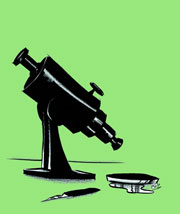“WE ARE TRYING so hard to lay low,” says a University of Washington scientist who heads a lab devoted to fetal tissue research. “I’m concerned about whether we’re even going to be open in a few months.”
His Central Laboratory for Human Embryology is one of only three federally funded labs nationwide supplying fetal tissue to investigators across the country. It is the largest of the three labs, distributing 10 to 15 samples a week, about a third of which typically go to UW researchers. The lab gets such tissues by collecting aborted fetuses from clinics, most of which are located around the state. It then isolates specific types of tissue, say brain tissue, to fill research requests.
That’s an inflammatory line of work at any time. In the past, the lab has been denounced by anti-abortion newsletters and Web sites around the country, and it’s been the subject of hostile proposals in the state Legislature. With the ongoing stem-cell debate potentially heightening sensitivities to fetal-tissue research in general, however, the lab’s chief scientist worries that he and his staff could be victimized by dangerous zealots. (He’s so concerned, in fact, that he pleads to have his name withheld.)
Moreover, there is a real chance that President Bush, who has temporarily blocked funding for stem-cell research, could move to ban funding for all fetal-tissue research as well. He has already stated that he opposes research on aborted fetuses.
Stem cells were isolated in human embryos only a few years ago. Derived most easily from petri dish embryos created at fertilization clinics, they are at such a young stage that they are not yet designated for specific organs; they could become anything. As such, they have the potential makings for miracle cures, but to the pro-life movement they also represent viable human beings.
Tissue from aborted and miscarried fetuses, in contrast, has been studied for at least 40 years, which is how the long the UW lab has been in existence. Fetal tissue is particularly useful for basic research into how cells and tissue develop—how, in other words, stem cells wind up being brains or lungs, and how those organs, in turn, grow. Scientists try to discern the conditions necessary for normal and abnormal development. Such information, they hope, can help them understand diseases like cancer, Alzheimer’s, and multiple sclerosis.
THE SCIENTIST AT the UW lab—call him Dr. X—believes that the advent of stem-cell research will make the work done by his lab and the researchers it supplies even more important. As scientists attempt to clinically turn stem cells into specific organs, he says, “going back and looking at how nature did it will probably provide clues that are going to be necessary.” The lab, too, could become a supply source for stem-cell researchers, though probably not many: The lab doesn’t test its samples for diseases, and the process of getting stem cells from aborted fetuses is laborious, involving fertilization of eggs taken from female fetuses.
Politically, fetal-tissue research has the advantage of utilizing fetuses that are already dead. On the other hand, working with dead fetuses seems ghoulish to the pro-life camp, which also feels such research promotes the abortion industry. “We don’t want to attach any benefit to [abortion] because that’s just going to propagate it further,” says Dr. Gene Rudd, associate executive director of the national Christian Medical Association.
The UW lab has been getting the attention of anti-abortion activists around the country since 1994, when the National Institutes of Health (NIH) described the lab’s services on an Internet notice. “Dead Babies for Sale,” screamed one article on a Web site run by a Baptist missionary in South Dakota. The article continued: “Here courtesy of the National Institutes of Health, in taxpayer-funded black and white, is the reality of America’s culture of death: commercial cannibalism of the young of the human species. . . .” Not too long ago, a church in Florida sent the lab 40,000 anti-abortion testimonials on pictures of dismembered fetuses.
Surprisingly, the lab has attracted little local attention. A couple of years ago, however, a few pro-life legislators started making inquiries about the lab and were invited to visit. Republican Philip Fortunato, who has since lost his South King County seat, came away unappeased. While he didn’t try anything as bold as a ban on fetal-tissue research—something that other state legislatures have enacted, only to be overturned by courts unhappy with vague wording—he helped sponsor a flurry of bills on the subject. One, which never got a hearing, would have required shipments of fetal tissue be marked as such in one-inch- high red ink. Another doomed bill was designed to prohibit profit making on fetal tissue. (Profit making is already barred by federal law, but Fortunato believes the lab is “double-billing” by charging researchers a processing fee, even though it receives an NIH grant to cover its expenses.)
The lab’s Dr. X replies that the NIH grant doesn’t even cover staff salaries. He says the lab charges a flat $100 each time it makes a visit to an abortion clinic on behalf of a researcher, no matter how much fetal material is retrieved. He adds that all the women who donate to the lab sign consent documents, although he says his staff has no contact with any of the women.
Dr. X says he’s proud of his lab. “It’s one of the few places in the world where really early embryonic tissue can be identified,” he says. The smaller the fetus, the harder it is to identify distinct organs: Over its decades of operation, he says, his lab has become uniquely skilled at it.
He says his work gives him no ethical quandaries. “My father died of Alzheimer’s. One of my closest friends died of breast cancer at 32.” There’s a choice, he says, “between using tissues to study diseases and grinding them up and putting them down the drain.” He chooses the former.









